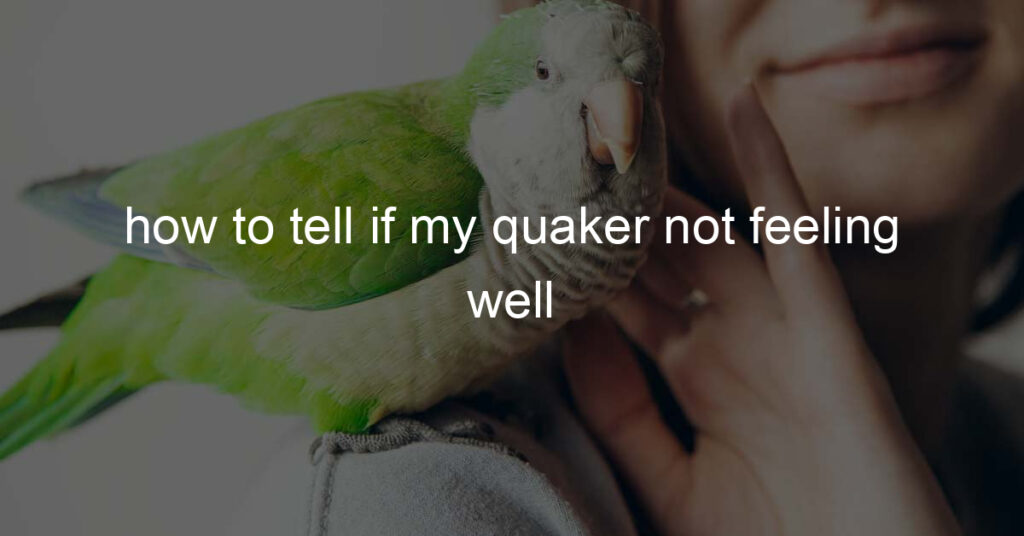Are you a passionate bird enthusiast and worried that your beloved quaker parrot might not be feeling well? Quakers, like all other birds, can’t tell us directly when they don’t feel good. So how can you know if one of these intelligent little parrots is under the weather?
Well, there are a few easy-to-detect signs to keep an eye out for to ensure the health of your feathered friend. Keep reading on to learn more about caring for quakers and find out what key indicators should alert you that it may be time for a trip to the vet!
1. Observe your Quaker’s eating habits – look for any changes in their appetite, such as eating less or not eating at all
2. Listen to your Quaker – check for any unusual vocalizations such as chirping, screeching, or quieting itself
3. Monitor your Quaker’s energy levels – pay attention to how active your bird is throughout the day, and whether it is still enjoying its toys and activities
4. Check for signs of illness – look for signs of sickness such as sneezing, coughing, or abnormal droppings
5. Take note of its behavior – if your Quaker is unusually listless, lethargic, or weak, it could be a sign of an underlying problem
6. Visit the vet if you are worried – make sure to get a professional diagnosis and proper treatment plan if you suspect there might be something wrong with your bird
What do you do if your bird doesn’t feel well?
When you own a pet bird, it’s important to monitor their well-being in order to ensure that they stay healthy and happy.
If you suspect that your bird is unwell, the best thing to do is take them to a veterinarian who specializes in avian medicine. They will be able to diagnose any potential health conditions and provide you with treatment advice that’s specifically tailored for your pet.
Make sure to provide your vet with a detailed history of your bird’s care so they can assess any changes in their lifestyle or overall health that could have caused the issue. Additionally, maintaining a clean habitat and providing them with nutritious food is essential for keeping your bird fit and feeling its best.
Is my bird tired or sick?
If you suspect that your beloved feathered friend is not doing so well, it can be hard to distinguish if they are simply fatigued or really unwell. To determine the difference, observe your bird’s behavior over the course of a few hours; look for any irregularities like a decrease in appetite or chirping, an increase in lethargy, or difficulty breathing.
Additionally, keep track of when they typically become tired and sick to better identify the signs. Consult with your veterinarian to get an expert opinion if anything feels out of place and rest assured that your darling companion will be back on their feet in no time.
What does a sick parrot look like?
A sick parrot’s behavior can be difficult to determine because many of the symptoms of diseases or illnesses vary depending on the individual bird and their age. However, some general signs that a parrot may be unwell include lethargy, changes in appetite, and difficulty standing.
A dulled plumage with an absence of preening can also be indicative of a sick parrot – particularly if the bird rapidly begins to ignore its normal grooming habits. In addition, hit-or-miss feather loss or sores appearing within the feathers may also signal sickness in birds.
Color changes in droppings are another common sign of health problems in parrots; unusually light or dark colored excrements (as opposed to their typical greenish-yellow color) should not be ignored and warrant closer monitoring.
How do I know if my parrot has a fever?
Knowing if your parrot has a fever allows you to take the necessary precautions and provide quick treatment. Symptoms of a fever in birds include decreased energy, lethargy, fluffed feathers, staying perched in one spot, lack of appetite and a decrease in vocalization.
When handling your parrot, check for any increase in body temperature compared to other birds around it. If you think your parrot may have a fever, measure its body temperature with a thermometer and consult your vet if it is over 104F. Take note of the surrounding environment to make sure it is not too warm or cold for the bird which may otherwise lead to overestimating its temperature.
Lastly, watch out for signs that your parrot might be ill such as nasal discharge, coughing or sneezing as well as changes in their behavior or attitude. By recognizing these symptoms early on and implementing appropriate care, you can help keep your feathered friend safe and healthy!
Final Words
Different symptoms could indicate that your Quaker is feeling unwell, so it is important to be mindful of any changes in their behavior. Always make sure to provide them with plenty of fresh food, water and a clean cage with plenty of personal space. If you notice any unusual activity or behavior, it might be time to take them for a visit to the vet’s office.
Lastly, even though birds can be affected by viruses and diseases, there are many simple things that you can do as an owner to ensure that your Quaker stays healthy in the long run including maintaining proper nutrition, making sure their cage is spacious and stimulating and providing daily mental stimulation through playtime and socialization.








